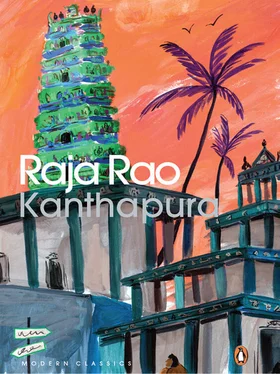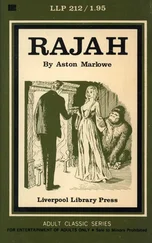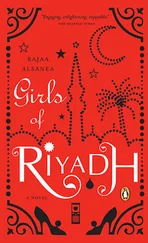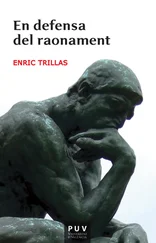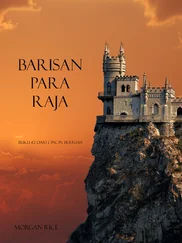Raja Rao - Kanthapura
Здесь есть возможность читать онлайн «Raja Rao - Kanthapura» весь текст электронной книги совершенно бесплатно (целиком полную версию без сокращений). В некоторых случаях можно слушать аудио, скачать через торрент в формате fb2 и присутствует краткое содержание. Год выпуска: 2014, Издательство: Penguin, Жанр: Классическая проза, на английском языке. Описание произведения, (предисловие) а так же отзывы посетителей доступны на портале библиотеки ЛибКат.
- Название:Kanthapura
- Автор:
- Издательство:Penguin
- Жанр:
- Год:2014
- ISBN:нет данных
- Рейтинг книги:3 / 5. Голосов: 1
-
Избранное:Добавить в избранное
- Отзывы:
-
Ваша оценка:
- 60
- 1
- 2
- 3
- 4
- 5
Kanthapura: краткое содержание, описание и аннотация
Предлагаем к чтению аннотацию, описание, краткое содержание или предисловие (зависит от того, что написал сам автор книги «Kanthapura»). Если вы не нашли необходимую информацию о книге — напишите в комментариях, мы постараемся отыскать её.
Kanthapura — читать онлайн бесплатно полную книгу (весь текст) целиком
Ниже представлен текст книги, разбитый по страницам. Система сохранения места последней прочитанной страницы, позволяет с удобством читать онлайн бесплатно книгу «Kanthapura», без необходимости каждый раз заново искать на чём Вы остановились. Поставьте закладку, и сможете в любой момент перейти на страницу, на которой закончили чтение.
Интервал:
Закладка:
This cools Bhatta, and wiping his forehead, he says, ‘Rangamma, you are as a sister to me, and I am no butcher’s son to hurt you. I know you are not a soul to believe in all this Pariah business. But I only want to put you on your guard against Moorthy and these city boys. I see no fault in khadi and all that. But it is this Pariah business that has been heavy on my soul. ’
Our Rangamma is no village kid. It is not for nothing she got papers from the city, Tai-nadu, Vishwakarnataka, Deshabhandu, and Jayabharatha, and she knows so many, many things, too, of the plants that weep, of the monkeys that were the men we have become, of the worms, thin-as-dust worms that get into your blood and give you dysentery and plague and cholera. She told us, too, about the stars that are so far that some have poured their light into the blue space long before you were born, long before you were born or your father was born or your grandfather was born; and just as a day of Brahma is a million million years of ours, the day of the stars is a million million times our day, and each star has a sun and each sun has a moon, and each moon has an earth, and some there are that have two moons, and some three, and out there between the folds of the Milky Way, she told us, out there, there is just a chink, and you put your eyes to a great tube and see another world with sun and moon and stars, all bright and floating in the diamond dust of God. And that gave us such a shiver, I tell you, that we would not sit alone in the kitchen that night or the night after. And she told us, too, how in the far-off countries there were air vehicles that move, that veritably move in the air, and how men sit in them and go from town to town; and she spoke to us, too, of the speech that goes across the air; and she told us, mind you, she assured us — you could sit here and listen to what they are saying in every house in London and Bombay and Burma. But there was one thing she spoke of again and again — and, to tell you the truth, it was after the day the sandal merchant of the North came to sell us his wares and had slept on her veranda and had told her of the great country across the mountains, the country beyond Kabul and Bukhara and Lahore, the country of the hammer and sickle and electricity — it was then onwards that she began to speak of this country, far, far away; a great country, ten times as big as, say, Mysore, and there in that country there were women who worked like men, night and day; men and women who worked night and day, and when they felt tired, they went and spent their holiday in a palace — no money for the railway, no money for the palace — and when the women were going to have a child, they had two months’ and three months’ holiday, and when the children were still young they were given milk by the Government, and when they were grown up they were sent free to school, and when they grew older still they went to the universities free, too, and when they were still more grown-up, they got a job and they got a home to live in and they took a wife to live with and they had many children and they lived on happily ever after. And she told us so many marvellous things about that country; and mind you, she said that there all men are equal — every one equal to every other — and there were neither the rich nor the poor. Pariah Ramakka, who heard of it one day, said, ‘So in that country Pariahs and Brahmins are the same, and there are no people to give paddy to be husked and no people to do it — strange country, Mother.’ But Rangamma simply said, ‘My paper says nothing about that,’ and continued measuring the unhusked rice. Oh, she told us so many, many interesting things — and all came from these white and blue papers, sister!
So, as I was saying, Rangamma was no village kid like us, and she could hold a word-for-word fight with Bhatta. But you know what a deferent, soft-voiced, gentle-gestured woman she is. She simply said something about Gandhiji’s Life, and how she would look into it, and how she would ask Moorthy — and at the name of Moorthy, Bhatta again went into a rage and said that the first time he saw Moorthy in the Pariah street he would have him outcasted and old Ramakrishnayya said, with his usual goodness, that it was no use harming a young man, and that young men were always fervent till they touched the bitter leaves of life, and that Moorthy, particularly, was a nice Brahminic boy — he neither smoked nor grew city-hair, nor put on suits and hats and shoes. And at this Bhatta grew suddenly calm and respectful and he said it was all a passing anger, and that Moorthy was a good fellow and if only he would get married and settle down, nobody would be happier ‘than this poor Bhatta, well-wisher of cows and men. ’
Then Rangamma’s sister, Kamalamma, came along with her widowed daughter, Ratna, and Bhatta rose up to go, for he could never utter a kind word to that young widow, who not only went about the streets alone like a boy, but even wore her hair to the left like a concubine, and she still kept her bangles and her nose rings and earrings, and when she was asked why she behaved as though she hadn’t lost her husband, she said that that was nobody’s business, and that if these sniffing old country hens thought that seeing a man for a day, and this when she was ten years of age, could be called a marriage, they had better eat mud and drown themselves in the river. Kamalamma silenced her and called her a shameless and wicked-tongued creature and said that she ought never to have been sent to school, and that she would bring dishonour to the house. Ratna would beat her clothes on the river-stones, beat them and wet them and squeeze them, and packing them up, she would hurry back from the river alone — all alone across the fields and the lantana growth. The other women would speak of the coming Rampur Temple festival or of the Dharmawar sari which young Suramma had bought for her son’s haircutting ceremony, and when Kamalamma was gone they would spit behind her and make this face and that, and throwing a handful of dust in her direction, pray for the destruction of the house. Kenchamma protected virtue and destroyed evil. She would work the way of Dharma.
Bhatta, however, would not say all this. After all, he was not a woman, and Ratna’s father was, moreover, his second cousin. And Ratna had lain in his lap as a child, and had played with him in his courtyard, and if she was rough of tongue, she was of the Chanderhalli family and she would bring shame to none. And as for all these fools who were saying she was found openly talking to Moorthy in the temple, and alone too — well, let them say what they liked. You cannot put wooden tongues to men.
But somehow Bhatta could not bear the sight of these ‘modern ways’ of Kamalamma’s daughter, particularly since she came of age, and when her sari fell over her shoulders and bared her bodice, it always made him feel uncomfortable. So he rose up and, saying ‘I’ll go,’ went down the steps and disappeared into the night.
At Agent Nanjudia’s house they were haggling with some peasants, and in the Post-office-house there was a lamp on the wall, and they were seated at their eating-leaves, and when Bhatta turned round the promontory corner and passed Rama Chetty’s shop, he saw in front of him a figure moving with slow, heavy steps. And as the sky was all black now and not a star stood to the summit of the mountains, he thought it was Pandit Venkateshia going to see his daughter. But he could not make sure and something stopped him from saying, ‘Who’s there?’ and the nearer Bhatta came the slower moved the person, and at last, when Bhatta was by Dorè’s cardamom gardens, something in him trembled and he said, ‘Who’s there, brother?’ And there was no answer but a cough and a sneeze and the beating of a stick against the quiet branches of the pipal; and when Bhatta repeated, ‘Who’s there, brother!’ this time, firm and sharp, came the answer, ‘What does that matter to you?’ and as Bhatta entered his courtyard, there fell on the figure a pale, powdery light from the veranda lantern, showing a beard, a lathi and a row of metal buttons. Then suddenly the figure turned to Bhatta and said:
Читать дальшеИнтервал:
Закладка:
Похожие книги на «Kanthapura»
Представляем Вашему вниманию похожие книги на «Kanthapura» списком для выбора. Мы отобрали схожую по названию и смыслу литературу в надежде предоставить читателям больше вариантов отыскать новые, интересные, ещё непрочитанные произведения.
Обсуждение, отзывы о книге «Kanthapura» и просто собственные мнения читателей. Оставьте ваши комментарии, напишите, что Вы думаете о произведении, его смысле или главных героях. Укажите что конкретно понравилось, а что нет, и почему Вы так считаете.
